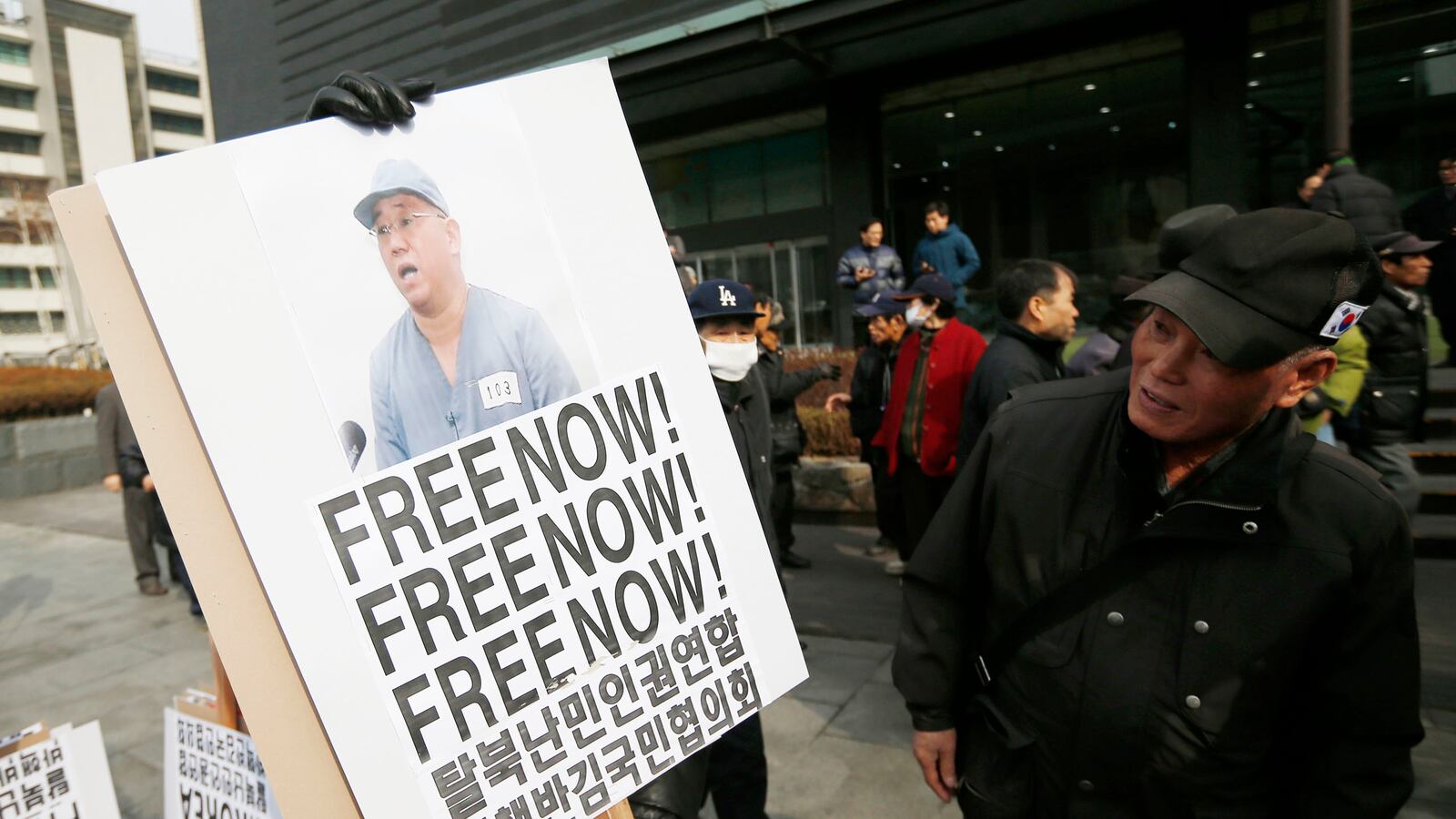Late Thursday North Korea announced the detention of Jeffrey Edward Fowle, who it claims is an American citizen. According to the official state news agency, Fowle is accused of “committing acts inconsistent with the purpose of a tourist visit.” Fowle would be the third American now being held by North Korea.

This troubling trend comes as the North Korean government is growing increasingly desperate to grab attention from the outside world. The Americans are likely being held as bargaining chips by the violent, attention-starved regime in order to seize attention or demand concessions.
North Korea’s usual methods of getting attention have experienced diminishing returns, and it may have decided to start keeping hostages. To get them out, Washington might have to play Pyongyang’s game.
Little or nothing is known about Jeffrey Edward Fowle—if that is his real name. We do know, however, that North Korea has held nine Americans since 2009. Most have been released, but recently North Korea has begun keeping Americans.
North Korea currently holds two other Americans. Kenneth Bae, an American missionary of Korean descent, was detained in November 2012 for allegedly trying to bring down the government. Bae was sentenced to 15 years’ hard labor in a work camp and is reported to be in deteriorating health.
Two months ago, Pyongyang said it had detained Matthew Todd Miller, for “a gross violation of its legal order.” Little is known about Miller, who, according to North Korea, reportedly tore up his visa and demanded asylum.
Most countries would simply deport foreigners and be done with it. Not North Korea. Robert Kelly, associate professor for political Science and diplomacy at South Korea’s Busan University, told The Daily Beast, “North Korea has a history of extraordinarily unconventional bargaining tactics. It violates the most basic norms of international relations to pursue advantage, which is a major reason why North Korea is considered so dangerous.”
“There are many disturbing dictatorships in the world,” Kelly said, “but few that disregard even the basic elements of diplomacy, such as not kidnapping foreign civilians.”
What advantage does North Korea seek in keeping American citizens?
North Korea casts itself as a revolutionary state. Like all revolutionary governments, it has to keep the revolution going in order to stay in power—and help explain the country’s dire economic state. A key part of that is designating an enemy of the revolution and for North Korea, that enemy is the United States.
But enemies of the revolution have to look engaged to be credible, and these days it’s been difficult to get the Americans’ attention. Washington has been preoccupied with the wars in Iraq and Afghanistan for more than a decade and has been dead set against having to juggle a third crisis.
North Korea has repeatedly tried to provoke South Korea—and by extension the U.S.—into a political crisis. The recent sinking of a South Korea navy ship by a North Korean submarine, the shelling of the South’s Yeongpyeong Island, and the artillery attack on a South Korean navy ship on May 22nd all garnered the country attention.
At the same time, however, the pattern has made the North Korean leadership predictable. The North Korean leadership makes one attack and stands down; the country cannot afford to let these situations grow out of control. The leadership knows that war means the end of the regime. The lack of escalation makes the attacks easier for the South Koreans and Americans to shrug off.
Washington, in particular, has been loath to do anything that might escalate. In his memoirs, former Secretary of Defense Robert Gates recalled dissuading South Korea from heavy retaliation after the 2011 Yeongpyeong Island incident. While officials in Seoul wanted to strike back harder than it ultimately did, the Pentagon stepped in to prevent any strikes that could escalate matters.
Now, with the war in Iraq over and the war in Afghanistan winding down, the U.S. has announced its return to Asia with the so-called Asian Pivot. To North Korea’s disappointment, this has little to do with North Korea and everything to do with a rising China.
Detaining Americans is a low-risk way for North Korea to get America’s attention. America is not going to risk a military confrontation over a handful of citizens, but it can’t ignore their plight, either.
What would get the Americans freed? It’s hard to say, because we don’t know what the North Koreans want. Visits by former U.S. Presidents Jimmy Carter and Bill Clinton, however, have resulted in the release of several Americans, including Aijalon Mali Gomes and the journalists Euna Lee and Laura Ling. North Korea was satisfied that an American president came to Pyongyang, hat in hand.
At other times, North Korea might want aid economic and food concessions, especially during periods of hardship and famine. But, Robert Kelly warns, they will not give something for nothing. “They are canny negotiators,” Kelly said, “Nothing is ever done in good will. If they can trade [an American] for something, they will.”
That may be the entire point.






